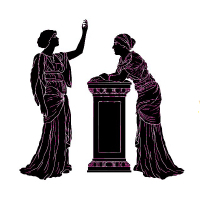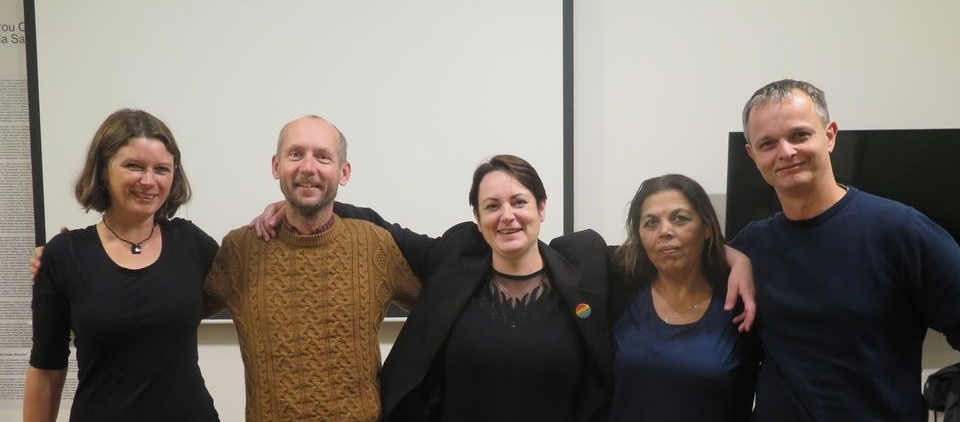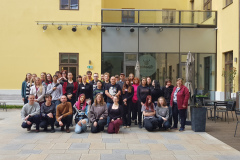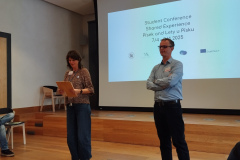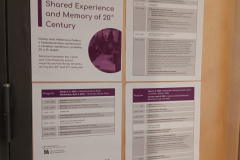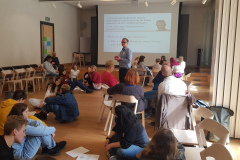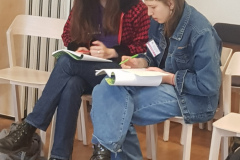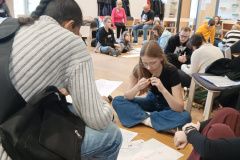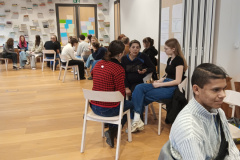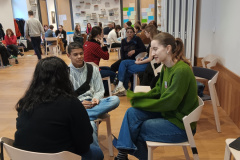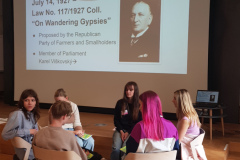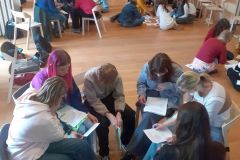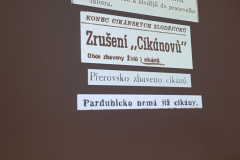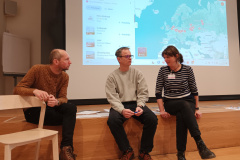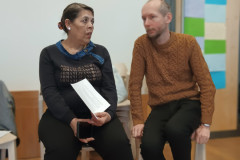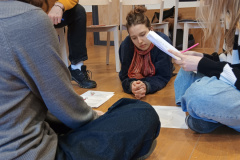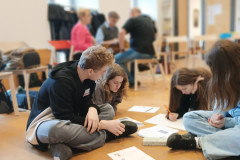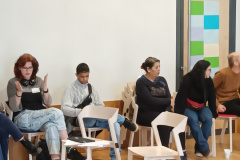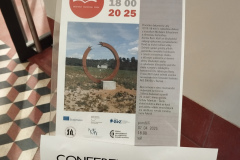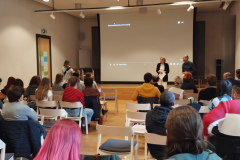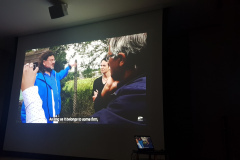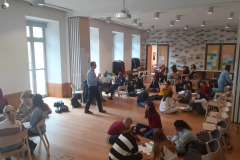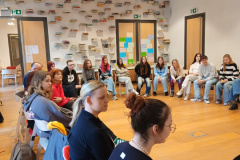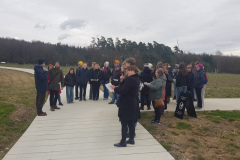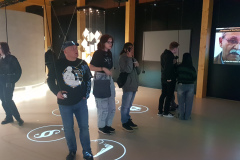Ve dnech 7. až 9. 4. 2025 se uskutečnila mezinárodní studentská konference Sdílená zkušenost a paměť 20. století. 31 mladých lidí z České republiky, Německa a Slovenska a jejich 5 učitelů se během tří dnů věnovalo hlubšímu poznání vztahů mezi většinovou českou a československou společností a romskou menšinou v průběhu 20. a 21. století.
Během prvního dne konference, který probíhal v překrásných prostorách Městské knihovny Písek, se účastníci společně věnovali definici diskriminace, ale také přemýšlení o vlastní identitě – co je pro ně osobně důležité, jakým prizmatem nazírají svět. Věnovali jsme se postupně rozpravě nad tzv. zákonem o potulných cikánech z roku 1927 a přemýšlení nad tím, zda a v čem byl diskriminační, zároveň jsme hledali odpověď na otázku, kterou nastolil vládní zmocněnec pro lidská práva již v roce 1999 – zda by vláda ČR měla přijmout historickou zodpovědnost za protiromská opatření přijatá za první Československé republiky.
Další část programu byla věnována přípravě na úterní návštěvu Let u Písku – památníku holocaustu Romů a Sintů v Čechách: historikové Michal Schuster (Schola Fidentiae) a Aletta Beck (Německo) představili dějiny perzekuce českých a moravských Romů a historii letského tábora.
V podvečerní části konference, která byla přístupná i pro veřejnost, jsme promítli dokumentární film Lety z produkce Romea, která byla doprovozena diskusí a Michalem Schusterem a Alettou Beck.
Druhý den konference proběhl v nově vybudovaném památníku v Letech u Písku – účastníci konference měli možnost si samostatně projít venkovní i vnitřní část památníku, reflektovat své pocity a dojmy a klást dotazy Michalovi Schusterovi.
Odpoledne nás čekala zajímavá diskuse s Janou Kokyovou, předsedkyní Výboru pro odškodnění romského holocaustu, který převzala pro svém strýci Čeňkovi Růžičkovi, jež se o zbourání vepřína a vybudování důstojného památníku zasazoval mnoho desítek let. S Janou diskutovala členka spolku Schola Fidentiae a jeho první předsedkyně, Růžena Ďorďová, která coby členka spolu Konexe založeného významným českým aktivistou Miroslavem Brožem organizovala blokády vepřína v Letech. Diskusi účastníci hodnotili velmi vysoce – umožnila jim nazřít perspektivu těch, kterých se historie romského tábora osobně dotýká, neboť tvoří často součást jejich rodinných identit.
Ve středu pokračovala konference v písecké knihovně novým programem o zapomenutém a nyní znovu připomínaném vojákovi Imrichu Horváthovi, který byl strýcem Růženy Ďorďové. V rámci dalšího projektu Schola Fidentiae podpořeného německou nadací Erinnerung, Verantwortung, Zukunft (EVZ) jeho příběh v minulém i letošním školním roce zpracoval tým studentek Církevního gymnázia v Plzni, kteří jeho průběh účastníkům představili. Nedlouho po konferenci vyšel velký rozhovor Judity Matyášové s Michalem Schusterem o Imrichu Horváthovi v Lidových novinách.
Na závěr konference se skupinky studentů se svými učiteli věnovali přípravě plánů, co z témat představených na konferenci a jakým způsobem by ve svých školách chtěli představit.
Konference se účastnili studenti z 11 českých škol, nejen gymnázií, ale i obchodních akademií, zemědělské školy v Písku nebo průmyslové školy v Kutné Hoře, dále 2 německých gymnázií a gymnázia ze Žiaru nad Hronom.
Konferenci bylo možné konat díky podpoře Česko-německého fondu budoucnosti, Nadace EVZ, programu Erasmus+ a Ministerstva školství, mládeže a tělovýchovy ČR, jejichž podpory si velice vážíme.
Konference proběhla ve velmi milé a tvůrčí atmosféře, i přes těžká témata, která otvírala. Všech účastníkům děkujeme a těšíme se na další setkání!
Ze zpětné vazby:
- V seznamu obětí jsem našla dvě osoby z mojí rodné vesnice a ráda bych zjistila víc informací.
- Proč se o tomto tématu tolik nemluví? Proč trvalo tak dlouho, aby oběť Romů byla uznána?
- Určitě jsem změnila pohled na celou věc. Dozvěděla jsem se zde spoustu věcí, o kterých jsem neměla ani tušení, že byly.
- Proč to všechno? Proč se o tom neučí ve školách? Proč se o tom nemluví veřejně?
- Získala jsem úplně nové informace a debaty pro mě byly velmi přínosné, hodně jsem přehodnotila a zamyslela jsem se nad postavením Romů ve společnosti.
- Jaké si odnáším otázky? O čem všem ještě naše společnost nemluví? Jaké jsou ještě další hrůzy, které čas/společnost se snaží smazat/ popírat?
- Before this conference, I didn’t know much about the Roma Holocaust and I didn’t know at all about the difficulties of creating a Lety memorial after the war. I was very interested in the story of Růžena Ďorďová and how she fought for justice. Thanks to this conference, I learned that inhabitants of our village were also in Lety. I would like to explore their story more and share it with the public.
- Čemu bych se chtěl/a dál věnovat: Jak zařídit abychom všichni mohli v klidu žít pospolu, i když jsme součástí různých komunit a žijeme rozdílným způsobem života.
- Ráda bych pomohla s organizací školního výletu do Let a byla bych moc ráda, kdyby se z toho stala nějaká dlouhodobější tradice. Myslím, že by to mohlo opravdu pomoci studentům hlouběji si uvědomit hrůzy holokaustu, toho, jak místně i časově blízko nás se odehrával, i toho, jak dlouho po něm ještě nespravedlnost ve společnosti přetrvává.
- Jak family friendly ovlivnit mé kamarády a lidi v mém okolí, aby přestali chovat bezdůvodnost zášť k Romům a přestali se na ně dívat nadřazeně
- My views on the Roma community have not massively changed. But now, that I know more about their history, heritage and culture it makes me feel more closely tied to them. I myself am a part of a minority in the Czech republic and have never felt very connected to the Roma (and Sinti) community. Now I feel as though our communities have some similarities and it has made me respect them much more.
- I have a completely new knowledge on the topic Roma. Before this conference I had no Idea how miss treated the Roma were in the Czech Republic. I now know how sensible this topic is and how important it is to speak about it. And rework the things that happened in the past.
- Hlavně návštěva památníku Letů mnou velmi silně otřásla, hlavně při čtení jmen, kdy jsem si uvědomila, kolik malých dětí bylo v táboře zavražděno.
- The way that history is not jsut in the past and what interests m eis how people/groups of people actually do terrible cruel/unhuman acts. History is sadly never + always in the past and it is crucial to realize and recognize patterns in human behaviour to really make sure that staff like that will never happen again.
From April 7 to 9, 2025, the international student conference Shared Experience and Memory of the 20th Century took place.
A total of 31 young people from the Czech Republic, Germany, and Slovakia, along with their 5 teachers, spent three days deepening their understanding of the relationship between the majority Czech and Czechoslovak society and the Roma minority throughout the 20th and 21st centuries.
On the first day of the conference, which was held in the beautiful premises of the Písek Municipal Library, the participants focused on defining discrimination and also reflected on their own identities—what is personally important to them and through what lens they view the world. We engaged in a discussion about the so-called Law on Wandering Gypsies from 1927 and considered whether and in what ways it was discriminatory. At the same time, we sought answers to a question posed back in 1999 by the Government Commissioner for Human Rights: whether the Czech government should accept historical responsibility for anti-Roma measures adopted during the First Czechoslovak Republic.
Another part of the program prepared participants for Tuesday’s visit to Lety u Písku—the memorial to the Holocaust of the Roma and Sinti in Bohemia. Historians Michal Schuster (Schola Fidentiae) and Aletta Beck (Germany) presented the history of the persecution of Czech and Moravian Roma and the story of the Lety camp.
In the early evening, a public segment of the conference featured a screening of the documentary Lety, produced by Romea, followed by a discussion with Michal Schuster and Aletta Beck.
The second day of the conference took place at the newly built memorial in Lety u Písku. Participants had the opportunity to independently explore both the indoor and outdoor parts of the memorial, reflect on their impressions, and ask questions of Michal Schuster.
In the afternoon, we had an inspiring discussion with Jana Kokyová, chairwoman of the Committee for the Compensation of the Roma Holocaust. She took over this role from her uncle Čeňek Růžička, who had spent decades campaigning for the removal of the pig farm and the establishment of a dignified memorial. Jana was joined in the discussion by Růžena Ďorďová, a member of Schola Fidentiae and its first chairwoman. As a member of Konexe—founded by notable Czech activist Miroslav Brož—she had helped organize blockades of the pig farm in Lety. The discussion was highly valued by the participants, as it gave them insight into the perspectives of those personally affected by the history of the Roma camp, which often forms a part of their family identity.
On Wednesday, the conference continued at the Písek library with a new program about the forgotten and now re-remembered soldier Imrich Horváth, who was Růžena Ďorďová’s uncle. As part of another Schola Fidentiae project, supported by the German foundation Erinnerung, Verantwortung, Zukunft (EVZ), his story was researched by a team of students from the Church Grammar School in Plzeň. They presented their findings to the participants. Shortly after the conference, an extension interview by Judita Matyášová with Michal Schuster about Imrich Horváth was published in Lidové noviny.
At the end of the conference, student groups and their teachers worked on plans for how they would like to present the topics introduced at the conference within their own schools.
The conference welcomed students from 11 Czech schools—not only grammar schools but also business academies, an agricultural school in Písek, and a technical school in Kutná Hora—as well as two German grammar schools and a grammar school from Žiar nad Hronom.
The conference was made possible thanks to the support of the Czech-German Future Fund, the EVZ Foundation, the Erasmus+ program, and the Czech Ministry of Education, Youth and Sports, whose support we greatly appreciate.
The conference took place in a very warm and creative atmosphere, despite the heavy topics it addressed. We thank all participants and look forward to future meetings!
From the feedback:
- I found two names from my home village in the list of victims, and I would like to find out more information.
- Why is this topic not talked about more? Why did it take so long for the Roma victims to be acknowledged?
- I definitely changed my perspective on the whole issue. I learned a lot of things here that I had no idea about.
- Why all of this? Why isn’t it taught in schools? Why isn’t it talked about publicly?
- I gained completely new insights, and the discussions were very enriching. I re-evaluated many things and thought deeply about the position of Roma people in society.
- What questions am I left with? What else does our society avoid discussing? What other horrors is time/society trying to erase or deny?
- Before this conference, I didn’t know much about the Roma Holocaust and I didn’t know at all about the difficulties of creating a Lety memorial after the war. I was very interested in the story of Růžena Ďorďová and how she fought for justice. Thanks to this conference, I learned that inhabitants of our village were also in Lety. I would like to explore their story more and share it with the public.
- What I would like to focus on further: How to ensure that we can all live together peacefully, even if we belong to different communities and lead different lifestyles.
- I would like to help organize a school trip to Lety, and I would really appreciate if it became a long-term tradition. I think it could really help students better understand the horrors of the Holocaust, how close to us—both in time and place—it happened, and how long injustice has persisted in society even afterward.
- How can I influence my friends and people around me to stop harboring baseless resentment toward Roma and stop looking down on them?
- My views on the Roma community have not massively changed. But now, that I know more about their history, heritage and culture it makes me feel more closely tied to them. I myself am a part of a minority in the Czech republic and have never felt very connected to the Roma (and Sinti) community. Now I feel as though our communities have some similarities and it has made me respect them much more.
- I have a completely new knowledge on the topic Roma. Before this conference I had no Idea how miss treated the Roma were in the Czech Republic. I now know how sensible this topic is and how important it is to speak about it. And rework the things that happened in the past.
- The visit to the Lety memorial deeply shook me, especially when reading the names—I realized how many small children were murdered in the camp.
- The way that history is not just in the past and what interests me is how people/groups of people actually do terrible cruel/unhuman acts. History is sadly never + always in the past and it is crucial to realize and recognize patterns in human behaviour to really make sure that staff like that will never happen again.
